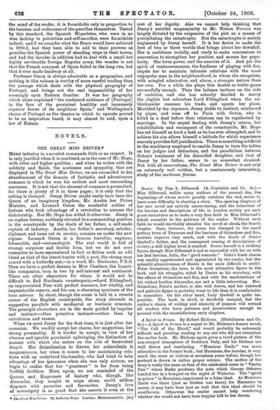NOVELS.
THE GREAT MISS DRIVER.*
MERE industry in a novelist commands little or no respect. It is only justified when it is combined, as in the case of Mr. Hope, with other and higher qualities ; and when he writes with the subtlety and finish, the acuteness and sympathy, that are displayed in The Great Miss Driver, we are reconciled to his abandonment of the domain of fantastic and adventurous romance in which he won his earliest and most resounding successes. It is not that the element of romance is proscribed, for there is plenty of it in these pages ; it is only that the setting is changed. Jenny Driver might easily have been the Queen of an imaginary kingdom, Mr. Austin her Prime Minister, and Leonard Octon the masterful soldier of fortune who took advantage of a revolution to assume the dictatorship. But Mr. Hope has willed it otherwise. Jenny is an orphan heiress, suddenly elevated to a commanding position in the countryside by the death of her father, a self-made captain of industry. Austin, her father's secretary, scholar, diplomat, and tame cat in excelsis, remains on under the new regime. Leonard Octon is a famous traveller, explorer, Ishmaelite, and—entomologist. The real world is full of strange surprises and double lives, but we do not ever remember to have encountered in fact or fiction such an odd blend as that of the insect-hunter with a past, the strong man armed with a butterfly-net,—in a word, Mr. Rochester, F.R.S. Then we have a perfect duenna in Miss Chatters, the limpet- like companion, torn in two by self-interest and sentiment. There are other characters for whom it would not be difficult to find Rmitanic counterparts,—Lord Fillingforcl, an impoverished Peer with perfect manners, low vitality, and impenetrable reserve, and his son, a charming specimen of the beau sahreur. In short, though the scene is laid in a remote corner of the English countryside, the story abounds in suggestive parallels with mediaeval or barbaric romance. The principal characters are in the main guided by impulse and instinct—often primitive instinct—rather than by calculation and reason.
When we meet Jenny for the first time, it is just after her accession. We readily accept her charm, her magnetism, her strong personality. It is harder to accept, in view of her obscure and ignoble provincial upbringing, the distinction of manner with which she enters on the role of benevolent despot. Her disinclination to disown her antecedents is magnanimous, but when it comes to her maintaining rela- tions with an underbred blackmailer, who had tried to take advantage of her ignorance when she was only sixteen, we begin to realise that her " greatness " is far from being faultily faultless, Here, again, we are reminded of the Queens and Enipteetee of history who, though, like Alexander, they sought to reign alone, could seldom ' dispense with parasites and favourites. Jenny's love of sovereignty is so great that she asserts it even at the • Tha Great Miss Driver. By Anthony Hope. London : Methuen and Co. [68.] cost of her dignity. Also we cannot help thinking that Jenny's suicidal magnanimity to Mr. Nelson Powers was largely dictated by the exigencies of the plot as a means of precipitating the catastrophe. But the catastrophe is mainly engineered by Jenny herself. It is her desire to make the best of two or three worlds that brings about her downfall. She is ambitious socially, and ready to make concessions to convention to strengthen her position and secure her popu- larity. She loves power, and the exercise of it. And yet the sphit of venturesomeness, the fondness of playing with fire, impels her to maintain intimate relations with the most unpopular man in the neighbourhood, in whom she recognises, with mingled admiration and alarm, a stronger nature than her own. For a while she plays this double or treble game successfully enough. Then the balance inclines on the side of ambition, and she has actually decided to marry the eligible but colourless Lord Fillingford when the ex- blackmailer resumes his trade, and upsets her plans. Mortified by the exposure, Jenny yields to instinct, reinforced by pique, and runs off to Paris with Octon, who is killed in a duel before their relations can be regularised by marriage. In the sequel dealing with Jenny's return, her rehabilitation and reconquest of the countryside, Mr. Hope has set himself as hard a task as he has ever attempted, and to achieve his aim allows himself a latitude for which experience scarcely provides full justification. There is something artificial in the machinery employed to enable Jenny to turn the tables on her judges and detractors, and the parallelism between Octon's treatment of his discarded daughter, and that of Jenny by her father, seems to us somewhat strained. But with all reservations, The Great Miss Driver is not only an extremely well written, but a continuously interesting, study of the maitresse femme.














































 Previous page
Previous page